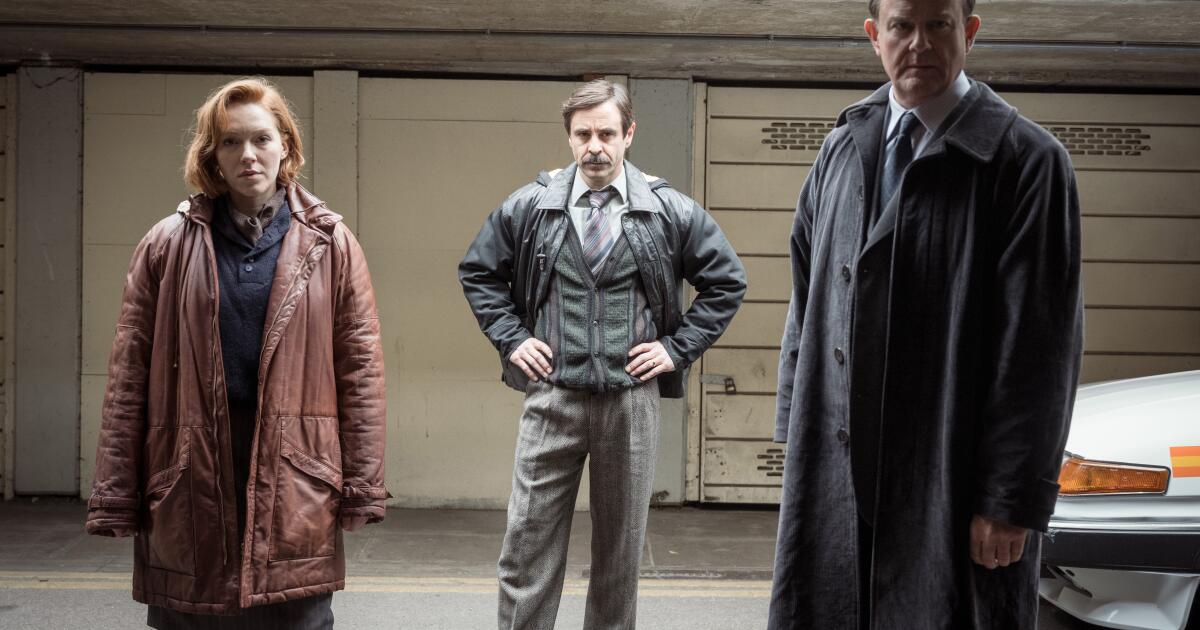On Nov. 26, 1983, six men robbed a warehouse serving London’s Heathrow Airport. Hoping to find £1 million worth of foreign currency, they found instead 6,800 gold bars, worth £26 million in 1983 money — a record-setting robbery at the time — under the temporary supervision of Brink’s-Mat. (A union of the American security firm and a British transport outfit.) This event has been transmuted into “The Gold,” an involving British drama premiering here Sunday on PBS.
The robbery itself takes up little screen time; the question on the criminal side becomes how to turn three tons of gold into cash, and for the police, one of recovering the loot and bringing the villains to justice. The cops and the criminals overlap here and there, a point screenwriter Neil Forsyth does not want you to miss, and is a particular bee in the bonnet of upright Detective Chief Superintendent Brian Boyce (Hugh Bonneville), self-contained but always ready to speak his mind. (He is also “infuriated” by what people get wrong about jazz, which he likens to police work.)
Recruited by Boyce to a special task force are detectives Tony Brightwell (Emun Elliott), historical, and Nicki Jennings (a charismatic Charlotte Spencer), invented, who are good company for the viewer and generally for each other, though as people who spend long hours sitting together in cars waiting for something to happen, they have their moments of friction, played for humor. As a created character, Jennings — who, as a woman, has to outline the many steps and hard work it took to achieve her position — offers an opportunity for emotional elaboration, notably in scenes (affectionate, prickly) with her father, Billy (Danny Webb), “by a country mile the worst villain in England,” his criminal career sidelined by ill health.
Though one of the actual robbers, Micky McAvoy (Adam Nagaitis), gets a good deal of attention, the bulk of the series involves three criminals subsequently processing the gold and laundering the money. Kenneth Noye (Jack Lowden) is “a fence with protection,” owing to his friendship with police officers through membership in the Masons. (When Boyce brings Jennings and Brightwell onto his team, he sets the rules as “no overtime, no drinking at lunchtime, no freemasonry.”) John Palmer (Tom Cullen), a dyslexic dealer in gold and jewelry, has a handy portable smelter in his yard. And the invented Edwyn Cooper (Dominic Cooper), an up-from-the-streets solicitor with posh airs and a rich wife whose snooty parents treat him with barely disguised disdain, finds himself working for “a group of businessmen who have a lot of money that needs to be made respectable,” in the words of liaison Gordon Parry (Sean Harris, sinister).
Stretched over six episodes, it’s not a speedy telling, and, in fact, a second series covering a long tail of aftermath has already aired in the U.K. Apart from some surveillance, tailing suspects, one fatal encounter and an occasional chase, there’s little in the way of capital-A Action, mostly just a lot of talk — inquisitive, instructive, threatening, discursive, domestic or speechifying. Though the production is naturalistic — in a way that ties it to an earlier, golden era of British productions — the dialogue can sound highly composed. Characters are given little monologues, often to explain how they became the person they are, that play as the sort of thing that might occur late in the last act of a stage drama: Jennings found the sirens outside her window comforting, which led her to police work, “so that kids like me will be safe”; Boyce had a life-changing moment involving a pair of red leather shoes while fighting in the so-called Cypriot Emergency. Some dialogue might have been lifted whole from a 1930s gangster film. Critiques of British class structure and bad actors within the police department are raised high enough to be impossible to miss.
There are a lot of moving parts in “The Gold,” represented in sometimes brief alternating scenes, and it may take a while, among the crooks, at least, to get a handle on things, to sort out where you are, who’s who, who’s married to whom, and what part each plays in the caper. Though Noye is arrogant enough to root against, Forsyth wants to show, as much as each character allows, the just-folks elements of his bad guys, psychologically relatable sorts who have, from early experience, a lack of opportunity, or a certain kind of genius, decided that the path to freedom is best paved with other people’s money. (“If it wasn’t for people trying trying to break out of the lives they’ve been given,” observes Boyce of his country’s social stratification, the police would be out of a job.) This may be soft-pedaling matters somewhat — to read the historical accounts might give you a different picture — but as drama it pays dividends.
As a period piece, it doesn’t oversell the era. There are old cars, of course, and more mustaches than we are currently accustomed to. But apart from the pop songs that run over the end credits, nothing screams These Are the ’80s. (Compare, for example, the “Life on Mars” sequel, “Ashes to Ashes.”) It’s more a question of what isn’t there. The detectives have a computer, but only Brightwell has an idea of what it’s for or how to use it. No cellphones, but there are walkie-talkies. A tracking device, apparently the only one in all of British law enforcement, has to be imported from Belfast (and sneakily at that). There is a refreshing absence of guns — none of those Kevlar-clad teams going in with pistols raised. (Just truncheons.) And the remodeling of East London into a gentrified glass forest, a minor plot point, has only just begun.
It’s like a vacation from now, and who can’t use one of those?
